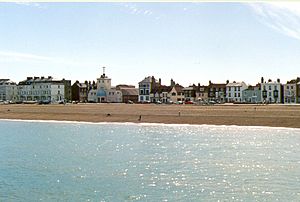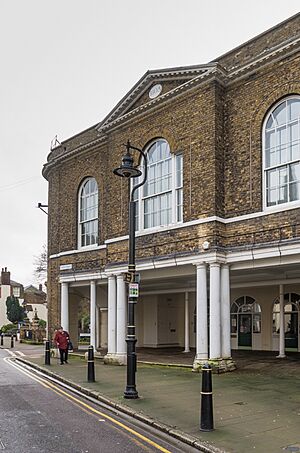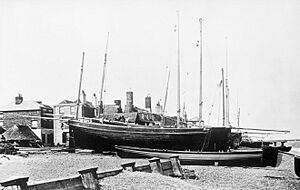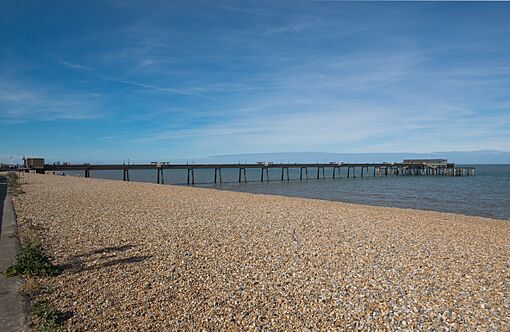Deal, Kent facts for kids
Quick facts for kids Deal |
|
|---|---|
 Deal seafront |
|
| Population | 30,917 (2021 census Deal Urban Area) |
| OS grid reference | TR375525 |
| • London | 83.9mi |
| District |
|
| Shire county | |
| Region | |
| Country | England |
| Sovereign state | United Kingdom |
| Post town | DEAL |
| Postcode district | CT14 |
| Dialling code | 01304 |
| Police | Kent |
| Fire | Kent |
| Ambulance | South East Coast |
| EU Parliament | South East England |
| UK Parliament |
|
Deal is a cool coastal town in Kent, England. It's located where the North Sea and the English Channel meet. Deal is about 8 miles (13 km) north-east of Dover and 8 miles (13 km) south of Ramsgate.
This town used to be a busy place for fishing, mining, and military activities. Its history is closely connected to a safe place for ships to anchor called the Downs. Near Deal is Walmer, which might be where Julius Caesar first landed in Britain a long time ago.
Deal became an important 'limb port' of the Cinque Ports in 1278. It grew to be one of England's busiest ports! Today, Deal is a fun seaside resort. Its charming streets and old houses remind everyone of its long history. Many ancient buildings and monuments are still standing. In 1968, Middle Street became the first special 'conservation area' in Kent. This means its historic character is protected. On clear days, you can even see the coast of France, which is about 25 miles (40 km) away! The Tudor-style Deal Castle was built by Henry VIII. It has a unique rose-shaped design.
Contents
History of Deal
Deal was first mentioned as a village in the Domesday Book in 1086. Back then, it was called Addelam. Later, it was known as Dela in 1158 and Dale in 1275. The name comes from an old English word, dael, which means 'valley'. It's like the modern word 'dale'.
Deal started to become a port by the end of the 1200s. In 1495, a person named Perkin Warbeck tried to land in Deal. He wanted to become king of England. But local people who were loyal to King Henry VII fought them off on the beach. This event is known as the Battle of Deal. Later, Henry VIII had three castles built around the town. These were Sandown, Deal, and Walmer castles. They were built to protect England from attacks by foreign navies.
In 1699, the people of Deal asked to become their own town. Before this, they were part of Sandwich. King William III agreed and made Deal an official town. The Deal Town Hall, where the town council used to meet, was finished in 1803.
In 1861, the Royal Marine Depot was set up in Deal. This was a base for the Royal Marines. In 1989, a tragic event occurred at the Royal Marine Depot, where some Royal Marines bandsmen lost their lives.
Deal's Sea History
Deal's coastline is very close to the famous Goodwin Sands. These sandbanks made the waters near Deal both a safe place and a dangerous one for ships. The Downs is the area of water between Deal and the sandbanks. It's a naturally sheltered spot where ships could anchor safely.
Because it's at the eastern end of the English Channel, sailing ships would often wait here. They waited for the right wind to either go into the North Sea or head west down the Channel. It was common to see hundreds of ships waiting for the wind to change! When the wind was right, ships would quickly leave. Other ships heading the opposite way might then arrive to anchor.
When the port of Sandwich became too shallow for ships, Deal became super important. It was the only way to get fresh food, supplies, and equipment to ships in the Downs. Boats would launch directly from the beach to deliver these items. This was a huge business for Deal. It continued until steamships took over from sailing ships. Deal was also a handy place for passengers to land if they were going to London. It saved them a long wait for the right wind to finish their journey.
One challenge in the Downs was that the seabed was chalk. This isn't the best for anchors. So, ships often dragged their anchors in strong winds. This created extra work for the town's boatmen. They would help save ships, which was another way they earned money.
The importance of the Downs started to decrease around the 1860s. Steamships were faster, and speed became very important for trade. Sailing ships began using tugboats to help them against bad winds. By the 1880s, only small sailing vessels regularly used the anchorage.
Famous people like Lord Nelson visited Deal. James Cook first stepped onto English soil in Deal in 1771. This was when he returned from his first voyage to Australia. The Downs is still used by ships today, but not as much as it used to be.
In 1672, a small Naval Yard was set up in Deal. It provided supplies and minor repairs for ships. Near the old yard, there's a building that was once a semaphore tower. It was meant to send messages to London. But in 1855, it became a timeball tower to help ships tell the time. Today, it's a museum!
The Deal Maritime and Local History Museum is in old industrial buildings from 1803. It shows displays and items about Deal's sea history, industries, home life, and fun activities.
Deal's Brave Boatmen
The boatmen of Deal were famous around the world. They were known for their amazing sailing skills and bravery. They used special boats built right there in Deal. They would launch and land these boats directly from the open beach. Only the very worst weather stopped the larger boats from going out.
They did many kinds of work. They took food and supplies to ships anchored in the Downs. The Post Office even paid them to deliver mail to or from ships. They also sold ballast (small stones from the beach) to ships. Passengers were taken to and from ships. Sometimes, a ship in the Downs would lose its anchor. This gave the boatmen two more jobs.
First, they had to keep the Downs clear of lost anchors. If not, other ships' anchors could get tangled. In the 1600s, two boatmen were paid to find and recover lost anchors. Many anchors were saved! From 1866 to 1869, over 600 anchors were pulled up from the Downs.
Second, a ship that lost its anchor needed a new one. The boatmen kept a large supply of anchors of all sizes. They would load a suitable anchor onto one of their big boats and sell it to the ship that needed it. In bad weather, providing an anchor was considered 'salvage' work. This meant it often saved the ship from being lost. After 1854, boatmen could get good payments for this dangerous service. In November 1859, they supplied 30 anchors and chains in just 12 days!
The boatmen also did other salvage work. This included bringing fresh crew to pump water from leaking ships. They also took cargo off ships that couldn't be saved. Sometimes, they even saved abandoned ships stuck on the Goodwin Sands. This earned them big rewards!
Deal also had a lot of smuggling, especially in 1737. Special fast boats called galleys were built for this. They were used in calm, misty weather when government boats couldn't catch them. In 1784, the government sent soldiers to Deal to stop this. They smashed or burned all the boats. This left the boatmen without a way to earn money. But when the Napoleonic Wars began, the many navy ships in the Downs needed their help. So, the boatmen were back in business!
Boats Used by Boatmen
In the 1800s, Deal boatmen used several types of boats. The two biggest were the Deal luggers. Early in the century, these were large boats with three masts. They had special sails called dipping lugs. They also had a small sail at the back and a jib sail at the front. The main mast was sometimes removed to make more space. After the 1840s, the main mast wasn't used at all.
The "first class" luggers were often called "forepeakers." They could be up to 38 feet (11.6 m) long and 12 feet 3 inches (3.73 m) wide. They carried 6 tons of ballast (weight) and weighed 3.5 tons themselves. These boats were built with overlapping planks, called clinker built. They had a closed area at the front where the crew could rest. But otherwise, they were open boats. These big luggers would carry replacement anchors to ships.
Smaller luggers were called "cats." They could do most of the same work as the larger boats. Instead of a closed front area, they had a removable cabin. This cabin could be set up between the seats. In 1833, Deal had 21 first-class luggers and 15 cats. That same year, 54 smaller boats called galleys were also used. These were lighter boats, between 21 and 30 feet (6.4 and 9.1 m) long. They could be sailed or rowed. They were used to take passengers to ships and to help pilots get on and off ships.
Launching a lugger was exciting! They were launched bows first down the beach. A chain was slipped, and the boat slid down greased wooden skids on the shingle. The goal was to gain enough speed to get through the first waves as the front sail was raised. A rope led to an anchor offshore could help steer the boat. If the boat didn't gain enough speed, it could be smashed by the waves. Launching was harder at high tide because there was less space to pick up speed.
When the boat's work was done, it was sailed onto the beach in front of a capstan (a large winch). A man in the sea would quickly attach a rope from the capstan to the boat. For a large lugger, it took 20 or 30 men at the capstan to pull the boat up the beach. Then they would turn it around for the next launch. This was a dangerous job, and people could get hurt if they lost control of the heavy boat.
A naval storehouse was built in Deal in 1672. It supplied ships anchored in the Downs. Over time, this base grew to cover about five acres of land, north of the castle. There was also a Victualling Yard on site, which provided food and drink. Unlike other naval yards, ships couldn't dock directly at Deal. Instead, many small supply boats were kept at the yard. These boats would launch from the shingle beach. They carried supplies, food, people, or equipment as needed. The Yard closed in 1864.
The Barracks
The Royal Marines Depot was built shortly after the French Revolution began. It first had separate barracks (living quarters) for cavalry and infantry soldiers. These were later called South Barracks. Next to them were separate hospitals for the Army and Navy. Later, these hospitals also became barracks, known as North Barracks and East Barracks. From 1861, the complex became a large base for the Royal Marines. It was especially known for the Royal Marines School of Music, which moved there in 1930.
Lifeboats
Deal has a long history of brave lifeboat crews. You can learn more about them at the Walmer and Deal lifeboats page.
Piers
Deal's seafront has had three different piers throughout its history. The first pier was built in 1838. It was designed by Sir John Rennie. But it was made of wood and was destroyed in a big storm in 1857.
It was replaced by an iron pier in 1864. This was a popular pier for fun and entertainment. It lasted until Second World War, when a Dutch ship hit it in January 1940. The ship had a mine, and the pier was badly damaged. This wasn't the first time the pier had been hit by a ship. It had been damaged in 1873 and 1884 too, needing big repairs.
The pier you see today was designed by Sir W. Halcrow & Partners. It was opened on November 19, 1957, by the Duke of Edinburgh. Deal's current pier is the only fully complete leisure pier left in Kent. It's also a Grade II listed building, which means it's a special historic structure.
Museums
Deal has several museums, and most of them are about Deal's sea history. Both Deal Castle and Walmer Castle are managed by English Heritage. Deal Castle has displays about the time of Henry VIII and why the castle was built. It also shows its later history. Walmer Castle focuses on its role as the Lord Warden's home after the Tudor period. There's also a ruin of the third Tudor castle, Sandown Castle, in North Deal.
The Deal Maritime and Local History Museum has exhibits of boats, smuggler galleys, and model naval ships. It also has lots of information about the lifeboats and local records. The Timeball Tower Museum teaches you about how important accurate time was for ships. It also explains the role of the building itself. The Kent Museum of the Moving Image (Kent MOMI) explores the long history of moving pictures. This includes old magic lantern shows, Victorian experiments, and the early days of cinema.
Local Media
Newspapers
Deal has one newspaper you can buy, called the East Kent Mercury. It's published by the KM Group.
Radio
Deal has an award-winning internet radio station called DR (Deal Radio). It's known as the UK's leading StreetSide radio station. It broadcasts 24/7 with news, music, and interviews. You can even visit their studio at 69A High Street and join in their community shows!
Deal also gets county-wide radio stations like Heart, Gold, KMFM, and BBC Radio Kent. DCR 104.9FM (Dover Community Radio) started broadcasting on 104.9FM in May 2022. It's a community radio station for Deal, Dover, and Sandwich. Before that, it was an online station that started in 2011.
Television
Local news and TV shows for Deal are provided by BBC South East and ITV Meridian. These come from the Dover transmitting station.
Transport
The town has Deal railway station on the Kent Coast Line. Trains are run by Southeastern. You can catch trains to London St Pancras International and Ramsgate. During busy times, there are also services to London Charing Cross via Tonbridge.
Sport and Leisure
Deal has a non-League football club called Deal Town. They play at The Charles Sports Ground. The rugby club, Deal & Betteshanger Lions, plays at the old Royal Marines Drill Field. Deal Rowing Club is located on the seafront, north of the pier.
There's a farmer's market every Wednesday where you can buy local produce. There's also a long-running market on Saturdays. Deal has many independent shops in the North End of Deal High Street. There are also some chain stores on the High Street.
The Lighthouse Music & Arts Venue offers live music and art events. The Astor Theatre in Deal has musical performances, live plays, exhibitions, films, classes, and clubs.
Deal used to have three cinemas: The Regent, The Royal, and the Odeon. But they all closed by 1984. A small cinema opened again in the old Odeon building, but it also closed in 2007. Deal's old bingo hall, in the Art Deco Regent building, closed in 2008.
Twin Towns
Deal is twinned with Saint-Omer, France. This means they are friendly partner towns.
Notable People
Many interesting people have connections to Deal!
- William Boys (1735–1803), a surgeon and writer.
- Admiral Sir John Harvey (1772–1837), a British Royal Navy officer during important wars.
- Antonio Blitz (1810–1877), a magician who performed in Europe and the USA.
- John Hulke (1830–1895), a surgeon, geologist, and fossil collector.
- Freddy McConnell, a journalist and trans man.
- Edward Millen (1860–1923), an Australian journalist and politician.
- Alan Patterson (1886–1916), an athlete who competed in the 1908 and 1912 Summer Olympics.
- Captain John William Pinder (born 1898), a British First World War flying ace.
- Carole White (born 1950), a former model and co-founder of Premier Model Management.
- James Arbuthnot, Baron Arbuthnot of Edrom (born 1952), a Conservative Party politician.
- Linda Ann Martin (born 1954), a fencer who competed in three Summer Olympics.
- Richard Ovenden (born 1964), a librarian and author, currently the Bodley's Librarian at Oxford University.
- Stephen Chidwick (born 1989), a professional poker player.
Actors from Deal
- Charles Hawtrey (1914–1988), a comedy actor who lived in Deal.
- Sir Norman Joseph Wisdom (1915–2010), a famous actor, comedian, and singer. He lived in a children's home in Deal for a while.
- Bruce Montague (born 1939), an actor known for the TV show Butterflies.
- Richard Cant (born 1964), an actor known for Midsomer Murders.
- Neil Stuke (born 1966), an actor known for Game On and Silk.
- Jack Scanlon (born 1998), an actor known for The Boy in the Striped Pyjamas. He lives in Deal.
- Hywel Bennett (1944–2017), a film and TV actor known for Shelley.
- Bernard Hepton (1925–2018), a film and TV actor known for Secret Army.
- Geoff Bell (born 1963), a film and TV actor in movies like Green Street and Kingsman: The Secret Service.
Musicians from Deal
- Edward Francis Fitzwilliam (1824–1857), a composer and music director.
- John Ireland (1879–1962), an English classical music composer. He lived in Deal.
- Nigel Rogers (1935–2022), a tenor singer.
- Dick Morrissey (1940–2000), a jazz musician and composer.
- Adrian Brett (born 1945), a flautist whose album was a UK Top 20 hit.
Writers from Deal
- Elizabeth Carter (1717–1806), a poet, classicist, writer, and translator.
- Stephen Phillips (1864–1915), a poet and dramatist who died in Deal.
- A. M. Irvine (1866–1950), an author who lived much of her life in Deal.
- Nathaniel Gubbins (1893–1976), a journalist and humorist.
- Elizabeth Bartlett (1924–2008), a poet born in Deal.
- William Horwood (born 1944), a novelist who grew up in Deal.
- Sean Gabb (born 1960), a writer, lecturer, and broadcaster who lives in Deal.
- Charlie Connelly (born 1970), an author and broadcaster.
- Alexander James Kent (born 1977), a cartographer, geographer, and academic who lives in Deal.
- Gregory Motton (born 1961), a playwright, author, and film director who lives in Deal.
Climate
The nearest weather station to Deal is in Langdon Bay. Deal has a mild sea climate. This means it has comfortable summers and cold winters. The temperature is usually between 3°C (37°F) and 21.1°C (70°F). But the temperature has ranged from -8°C (18°F) to 31°C (88°F). The sea is usually coldest in February. The warmest February temperature recorded was 13°C (55°F), while January has seen 16°C (61°F).
See also
 In Spanish: Deal (Inglaterra) para niños
In Spanish: Deal (Inglaterra) para niños
 | Dorothy Vaughan |
 | Charles Henry Turner |
 | Hildrus Poindexter |
 | Henry Cecil McBay |





